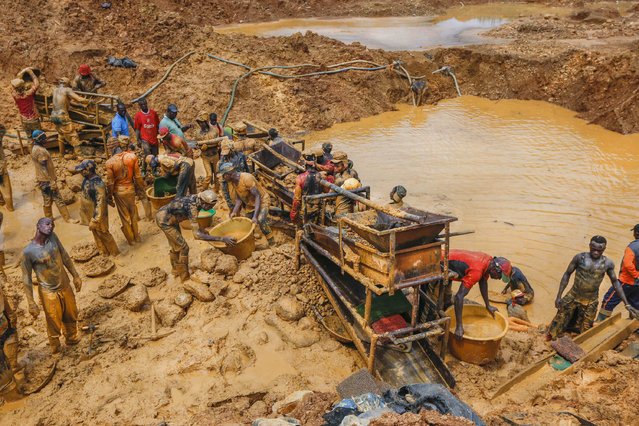Introduction:
Water, the elixir of life, has always been crucial to humanity’s survival and prosperity.
In Ghana, a country blessed with abundant rivers, lakes, and reservoirs, water is not just a resource but a vital component of cultural, economic, and environmental sustenance.
However, this invaluable asset is under threat due to destructive illegal mining activities known as galamsey.
As the world commemorates World Water Day, it’s imperative to delve into Ghana’s water situation, the menace of galamsey, and the pivotal roles political leaders, chiefs, and religious leaders must play in preserving these invaluable water bodies.
The Essence of Water in Ghana:
Water plays a multifaceted role in Ghana’s societal fabric. Historically, rivers such as the Volta, Pra, Ankobra, and Birim have not only sustained livelihoods but have also served as sacred sites and symbols of cultural identity.
These water bodies support agriculture, fisheries, transportation, and hydropower generation, contributing significantly to the nation’s economy.
Moreover, water holds profound spiritual and ritualistic significance in Ghanaian traditions, underscoring its cultural importance.
Galamsey Menace:
A Threat to Ghana’s Water Bodies:
Despite its importance, Ghana’s water bodies face a dire threat from illegal mining operations, commonly referred to as galamsey.
These activities involve the unregulated extraction of gold and other minerals, often using environmentally destructive methods such as mercury amalgamation and indiscriminate excavation. Galamsey pollutes water sources with toxic chemicals, sedimentation, and siltation, degrading water quality and disrupting aquatic ecosystems.
Additionally, deforestation and land degradation associated with galamsey exacerbate erosion, leading to the silting of rivers and loss of biodiversity.
The Role of Political Leaders:
Political leaders bear a significant responsibility in addressing the galamsey menace and safeguarding Ghana’s water bodies. They must enact and enforce stringent regulations to curb illegal mining activities, strengthen law enforcement mechanisms, and implement sustainable mining practices. Moreover, policymakers should prioritize environmental conservation and invest in water treatment infrastructure to ensure access to clean and safe drinking water for all citizens. Collaborative efforts with international organizations and neighboring countries can also enhance monitoring and enforcement efforts to combat transboundary water pollution.
The Leadership of Chiefs:
Traditional leaders, represented by chiefs and local authorities, wield considerable influence in Ghanaian society.
Chiefs must leverage their authority to advocate for the protection of water bodies within their jurisdictions.
By promoting community-based conservation initiatives, enforcing bylaws, and fostering dialogue with mining stakeholders, chiefs can play a pivotal role in mitigating the adverse effects of galamsey.
Furthermore, traditional institutions can revive indigenous environmental stewardship practices and instill a sense of environmental consciousness among their subjects.
The Influence of Religious Leaders:
Religious leaders, serving as moral compasses in their communities, possess the power to mobilize public opinion and promote environmental ethics.
They can incorporate teachings on environmental stewardship and reverence for nature into religious doctrines, emphasizing humanity’s responsibility to safeguard God’s creation. By fostering interfaith collaborations and engaging in advocacy campaigns, religious leaders can raise awareness about the ecological consequences of galamsey and mobilize grassroots support for conservation efforts.
The Role of Citizens:
Citizens are the backbone of any nation, and their active participation is vital in the preservation of Ghana’s water bodies.
They have a responsibility to abide by environmental regulations, refrain from engaging in illegal mining activities, and report instances of galamsey to authorities.
Moreover, citizens can contribute to conservation efforts through community-based initiatives such as tree planting, river clean-up campaigns, and advocacy for sustainable livelihoods.
By embracing a culture of environmental stewardship and holding elected officials accountable for their actions, citizens can amplify the collective voice demanding action against the galamsey menace and safeguarding Ghana’s water resources for future generations.
Conclusion:
As Ghana confronts the existential threat posed by galamsey to its water bodies, concerted action is imperative to ensure the preservation of this invaluable resource for future generations.
Political leaders, chiefs, and religious leaders must synergize their efforts, transcending partisan interests and vested agendas to prioritize environmental sustainability.
Through robust legislation, community empowerment, and moral advocacy, Ghana can reclaim its water heritage and reaffirm its commitment to safeguarding the lifelines of life. On this World Water Day and beyond, let us unite in the collective endeavor to protect and cherish Ghana’s precious water bodies for the prosperity and well-being of all.
Author: Lambert Donkor
(Advocate for Social Change)










